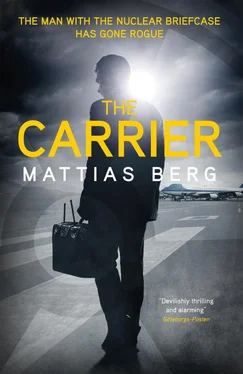Mattias Berg - The Carrier
Здесь есть возможность читать онлайн «Mattias Berg - The Carrier» весь текст электронной книги совершенно бесплатно (целиком полную версию без сокращений). В некоторых случаях можно слушать аудио, скачать через торрент в формате fb2 и присутствует краткое содержание. Город: London, Год выпуска: 2019, ISBN: 2019, Издательство: MacLehose Press, Жанр: Триллер, на английском языке. Описание произведения, (предисловие) а так же отзывы посетителей доступны на портале библиотеки ЛибКат.
- Название:The Carrier
- Автор:
- Издательство:MacLehose Press
- Жанр:
- Год:2019
- Город:London
- ISBN:978-0-85705-788-4
- Рейтинг книги:4 / 5. Голосов: 1
-
Избранное:Добавить в избранное
- Отзывы:
-
Ваша оценка:
- 80
- 1
- 2
- 3
- 4
- 5
The Carrier: краткое содержание, описание и аннотация
Предлагаем к чтению аннотацию, описание, краткое содержание или предисловие (зависит от того, что написал сам автор книги «The Carrier»). Если вы не нашли необходимую информацию о книге — напишите в комментариях, мы постараемся отыскать её.
The Carrier — читать онлайн бесплатно полную книгу (весь текст) целиком
Ниже представлен текст книги, разбитый по страницам. Система сохранения места последней прочитанной страницы, позволяет с удобством читать онлайн бесплатно книгу «The Carrier», без необходимости каждый раз заново искать на чём Вы остановились. Поставьте закладку, и сможете в любой момент перейти на страницу, на которой закончили чтение.
Интервал:
Закладка:
I stole a glance at Jesús María, who even now made no effort to join in the banter. Sat there in a sulk while Ingrid played her charades. Niklas pointed at the analog thermometer on the Norrbottens-Kuriren newspaper building. Held the steering wheel in one hand, his giant glove still on.
“At least minus 37 Celsius, isn’t it?”
“36.8 at the most,” I said.
He peered at me in the rearview mirror. It was always easy to win people’s confidence, to begin to build trust.
“Wish I had your eyesight, Bob. But where should we start, Inko?”
“Take the church. God’s work.”
Once we were in the church, she began to explain. That the exterior had been painted in Falun red and the roof covered in shingle; that the influences from Sami cots could be seen in the construction of the roof beam; how the light fell.
And it was so strange to hear Ingrid lecture again, the whole enchantment. Then we went out to the divine little park, with snow as thick as cream lying on the branches of the trees. That strange feeling of grace. At least there and then, in this particular moment.
Ingrid also told us that Kiruna Church was voted the most popular twentieth-century Swedish building in a national poll. And that this particular masterpiece would be spared destruction, since a gigantically complicated process was planned to move it in its entirety to another site in town.
“But Kiruna Town Hall is a tragedy. This will be the first and last time that you see it,” she said.
While Niklas drove us there—it was a lot safer for us in the truck than out in the streets during business hours—I tried to understand why Ingrid let us do this in the first place. Whether our sight-seeing might have some specific purpose, some connection to our assignment. Or if it was just designed, on the spur of the moment, to break the torment of our inactivity while waiting for Sixten.
But as soon as I stepped into the enormous entrance hall, feeling my eyes rise all the way up to the ceiling—I had to catch my breath at the sheer size of the space—I no longer cared which it was. I climbed reverentially up the broad stairs—and then stood there on the upper floor and slowly ran my hand over the por-phyry railings. A few feet away from me, Jesús María was doing the same. Closed her eyes, sighed, opened them again. Seemed, like me, hardly able to take in the idea. Of demolishing something like this, in peacetime, as if it had been an enemy military target.
I then went down into the basement and tried to interpret the local authority’s sketches of what was called the “Kiruna City Transformation”. Nothing really seemed to hang together. Not the dimensions, nor the scale, the size of the vast area which was to be moved in comparison with the small new center being built.
When we took the guided tour into the mine, just before it closed to the public for the day, I had the same feeling. At the Visitor Center a third of a mile down, we jostled with a group of American tourists, their cries of “Oh my God!”, “Unbelievable!”, “Fantastic!”, “Awesome!” ricocheted off the rock. I stood before the sketches in silence. Still trying to get my head around the “City Transformation”, until it was time for the tour bus to return to the surface. But despite the detailed diagrams showing how the vein ran—a one-mile tunnel of magnetite—and all these precise aerial photographs, I still did not understand why such a large part of town had to move.
I could not help thinking of Edelweiss’ “scenarios”, his false trails, diversions. Or the model communities which we threw up somewhere in the desert, only then to be able to bomb the hell out of them.
Back in Niklas’ truck we snaked our way up the mountain, increasingly on smaller tracks rather than roads, right into darkness. Until we saw the shining skulls in the trees. Heard—and felt—the music vibrating through the car.
Niklas’ camp turned out to be a crackpot hippie collective with death metal as its distinguishing characteristic. Violent music pumped out over the mountain. End of days lurked everywhere. Skulls, bones, garish posters saying “The Town of Death” or “#kirunaisdyingfight” with English text draped over the Swedish original, maybe for our sake, grotesque plastic heads stuck on poles, maybe hinting at those at the Inner Station in “Apocalypse Now”. Ingrid whispered that they represented the members of the Kiruna local government council.
We changed into jumpsuits like the one Niklas was wearing, before he led us out to the sleds. One could hardly hear the dogs’ furious barking over the music, their urge to start pulling. And soon the drift snow started whining across the camp. Through the combined din Niklas had to shout to us—even though we were standing next to him.
Jesús María helped Niklas to harness the twelve dogs, before taking her place nearest to them. I myself sat immediately behind her as we wrestled my hybrid and her medical pack down between us. Finally Niklas climbed up onto the runners at the back with Ingrid, still wearing her pack, next to him.
The dogs yelped madly before we got off to a start, uncontrolled, directionless. The back of my seat banged painfully against my vertebrae as the sled slid and bumped down the first steep hill below the camp. But after about a minute the barking had died away. The dogs forged ahead, twelve animals and one human conductor perfectly choreographed, each one with their exact place in the rigid hierarchy.
We were moving much faster than I had expected, despite the thickening snowfall. I had no idea where we were heading, was also under no illusion that I would be told if I asked. But at least we would not make ourselves visible in this open mountain terrain. “The worse, the better,” Edelweiss used to say about the correlation between weather and combat: there was no better camouflage than a sandstorm, thick fog or heavy driving snow, and Ingrid had taken this into account.
The snow lashed continuously against our covered faces, onto the balaclavas, goggles, headlamps. What little we could make out of the landscape was like sea bed rather than mountainside. The ice-tortured dwarf birches reminded me most of all of coral. Jesús María sat silently in front of me, observing the identical rhythm of the dogs, their co-ordinated instinct to run.
I closed my eyes and concentrated on trying to pick up some of Ingrid and Niklas’ conversation, in Swedish and through the howling wind. Wiggled my toes inside my boots to thaw out my right foot. Not even our winter equipment could deal with hours of sitting in what must have been negative twenty-two degrees, even though the temperature always rises when snow begins to fall.
“And are you sure you want to go all the whole way out there, Inko, in this nightmarish weather?” Niklas said.
“Absolutely. Now that we’ve come all the way across the Atlantic. It’s an adventure for us, after all, and we’re outdoors people just like you. It’s probably still your fault that I never choose the easiest way.”
“Yup, we got around, were pretty off-piste. But that was prehistory, forty-five years ago in October. I’d never have recognized you if you hadn’t called first. But I recognized the voice, naturally, same as ever.”
Niklas was quiet for only a moment. Then his curiosity got the better of him.
“And that guy Sixten… still in touch with him?”
“Not a peep since I left for the States. Ages ago.”
“Well, you were as different from each other as could be, Yin and bloody Yang. It would never have lasted.”
Suddenly the dogs turned in toward the edge of the trees and stopped at Niklas’ low command. The hut had appeared like a mirage out of the snow: even thirty feet away we had seen nothing of it.
Читать дальшеИнтервал:
Закладка:
Похожие книги на «The Carrier»
Представляем Вашему вниманию похожие книги на «The Carrier» списком для выбора. Мы отобрали схожую по названию и смыслу литературу в надежде предоставить читателям больше вариантов отыскать новые, интересные, ещё непрочитанные произведения.
Обсуждение, отзывы о книге «The Carrier» и просто собственные мнения читателей. Оставьте ваши комментарии, напишите, что Вы думаете о произведении, его смысле или главных героях. Укажите что конкретно понравилось, а что нет, и почему Вы так считаете.












